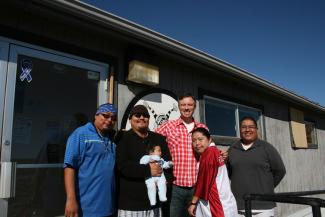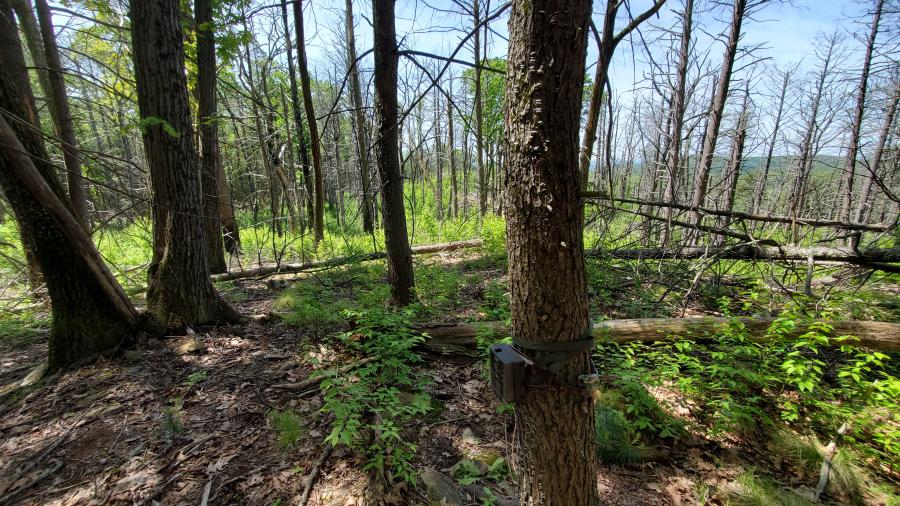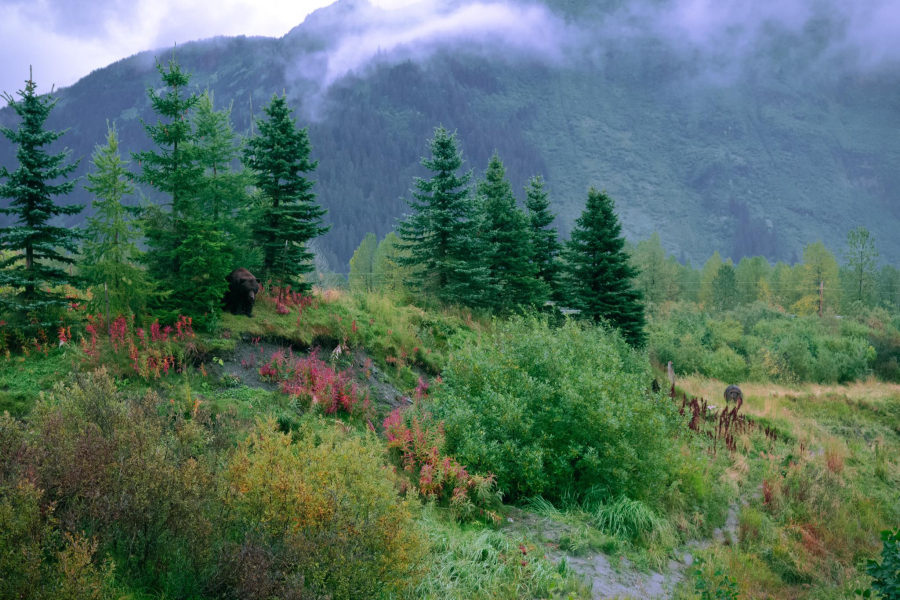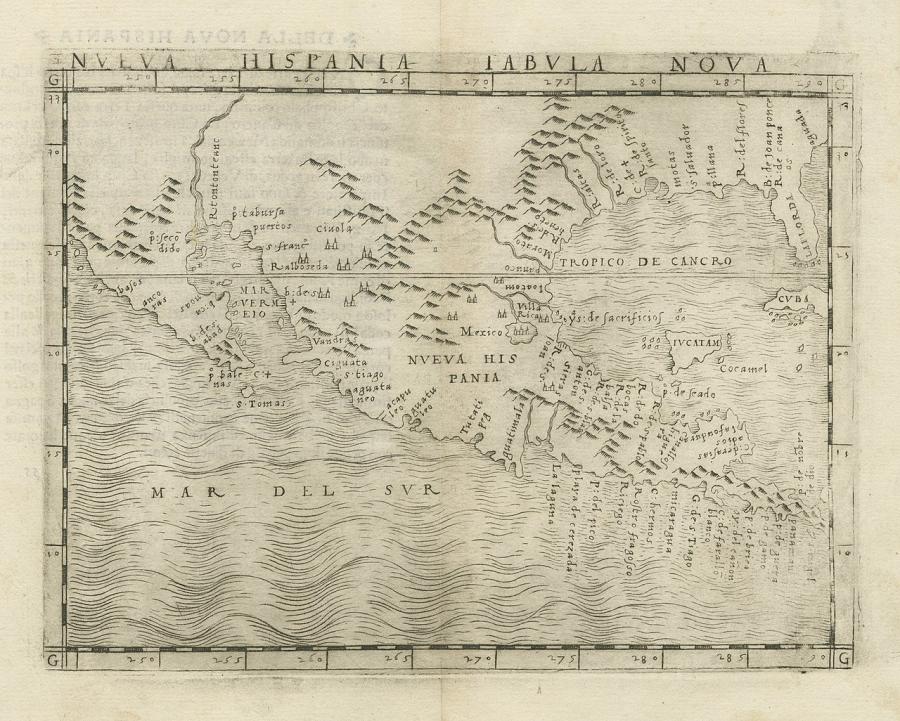
“I volunteer at the station because I want Hopi to learn and keep our own heritage and language. It is my passion and we receive encouragement from the community.— KUYI-FM radio volunteer
“The key to our survival as Indian people is not just preserving our cultural ways, but in devising ways to effectively interact with dominant society and with other cultures to coexist.”-- Former Hopi Chairman Vernon Mesayesva
More than a decade ago, in 2000, the inception of KUYI 88.1 FM in Keams Canyon, Arizona, began through community efforts to meet the growing need to hear the news and music in the Hopi language on the Hopi reservation in Northern Arizona. Today, inside almost every home, office, and vehicle, the radio is tuned to KUYI, which is also Hopi for “water.” The station has become an integral part of life on the Hopi reservation, as listeners start their day with a morning greeting in the Hopi Language. KUYI Hopi radio is a project of the Hopi Foundation, the oldest nonprofit organization on the Hopi Reservation that invests in local capacity building and community-based solutions. The station is one of roughly 50 that broadcasts on Native American lands to Native American listeners.
KUYI is fortunate to have a staff of volunteer DJs who are fluent in Hopi. They share the Hopi language through the airwaves, ensuring the language is heard and spoken. And they serve as positive role models for youth, giving them a sense of pride in their identity, language, and heritage. The sharing of language creates a strong connection with “home,” as apparent by Hopi listeners who live around the world and listen online. Volunteer DJ Bruce Talawyma says, “Speaking Hopi on-air is a comfort to fluent speakers. To non-fluent speakers it is a way for them to hear, learn, and engage. The language is not spoken by the younger generation; they are hungry to learn, yet they don’t have a place to learn. I hope that by my continuing to speak, the language will be picked up.”
Hopi elders say that our language is the root of perpetuating Hopi culture. Fluency began to decline during the era when children were forced into local mission and Bureau of Indian Affairs boarding schools. With the decline of their language, Hopi people also experienced a loss of cultural identity. Those who attended the boarding schools from the 1940s through the 1960s now find it difficult to teach their children and grandchildren to speak Hopi because they are not fluent themselves.
A 1998 language survey by the Hopi Cultural Preservation Office found that 100 percent of Hopi elders (60 years or older) were fluent, while fluency in adults age 40-59 was only 84 percent; the numbers dropped to 50 percent in young adults age 20-39; and just 5 percent in children age 2-19. The survey projected that within one to two generations, the Hopi language would be completely lost—unless young adults and children begin to learn, speak, and practice their language.
For this reason, among so many others, KUYI serves as a lifeline to and for our community. Recently, on one of the coldest mornings in northern Arizona history, KUYI listeners heard the news of a rockslide and resulting road closure leading up to the First Mesa Villages in both English and Hopi. Bilingual broadcasting was not possible prior to the inception of KUYI. In addition to reaching the local community spread across the 1.5 million acre reservation, as well as neighboring communities of Flagstaff, Tuba City, Winslow, and the I-40 corridor, the station has started streaming at www.kuyi.net. We have a Facebook and a Twitter page, and our listeners post comments that we air as part of a discussion. The station also receives letters, phone calls, and in-person listener visits that help shape new content and programming. Personal feedback sustains our relationship with our community.
KUYI not only provides a window to the world through its affiliations with Native Voice One and National Public Radio, but also broadcasts an eclectic variety of music. Over the past five years the station’s collection of Hopi music has quadrupled, although limited resources prevent us from recording more music. Hopi Radio provides a new way of storytelling, an age-old tradition. We broadcast national news and debate and discuss how it affects our people and our community.
Through Hopi Radio, we reaffirm our respect for tradition by preserving our language and culture in a contemporary context. Station programming revolves around the Hopi traditional calendar, which is based on the lunar calendar and deeply rooted around agricultural practices, honoring our traditions and ceremonial practices. During the month of Kyaamuya (December), the station only plays soft music—no drumming, no hip-hop or rap songs, and no hard rock. The station also makes an effort to air stories in Hopi, Hopi/English, and stories from other tribes, since storytelling is traditionally done in the winter months. A daily community calendar airs at least three times a day to keep the community informed.
KUYI has also partnered with several local entities to create culturally relevant local programming. The Hopi Foundation’s Hopi Lavayi (Hopi Language) program consists of monthly segments as well as recordings about this date in history. The Hopi Foundation's Natwani Coalition and local farmers sponsor “Farm Talk,” a show about traditional Hopi agriculture that also includes live interaction with listeners through call-ins and feeds from Facebook and Twitter. The Hopi Tribe Cultural Preservation Office, with assistance from community volunteers, runs the winter storytelling and other cultural education segments exclusively in the Hopi language. The “Shooting Stars” radio program has also worked with the Hopi Head Start Program and Mesa Media Inc., to develop an educational program of benefit to Hopi students of all ages; the weekly Hopi Lavayi segments coincide with the Head Start’s Hopi Lavayi Curriculum. Organizations working on combatting domestic violence also utilize our air waves.
The use of the Hopi language on air is increasing by popular demand. In January 2013, the station did a live remote broadcast from Moencopi Village on the opening of the first-ever elder Hopi assisted living community, as well as a high school basketball game. This past season KUYI also aired a football game by a volunteer broadcaster doing a play by play in Hopi. As Talayma says, “The community is realizing the role of the station to perpetuate the language and culture and they are becoming more accepting of the station as a tool. The cultural discussions are creating more awareness and the general public appreciate the discussions.” Talawyma’s ultimate wish is to hear the younger generation DJ at the station in fluent Hopi, and that wish might soon come true.
--Cara Dukepoo (Diné) is a long-time volunteer at KUYI-FM and the producer of “Shooting Stars.”
Listen to the KUYI podcasts here: www.kuyi.net including Dukepoo’s show, “Shooting Stars,” for youth and children. |
Links:
http://www.kuyi.net/education/shooting-stars/sshlp
https://soundcloud.com/kuyi_shootingstars
https://www.facebook.com/KUYIRadio/info
https://twitter.com/KUYI




